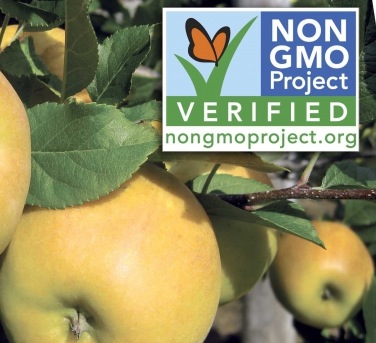
Non-browning GMO Arctic Granny and Arctic Golden. (Courtesy Okanagan Specialty Fruits)
The U.S. Department of Agriculture’s Animal and Plant Health Inspection Service announced today (February 13) its decision to deregulate the first two non-browning apple varieties, Arctic Golden and Arctic Granny.
These Genetically Modified (GMO) Arctic apple cultivars were developed through the use of biotechnology by Okanagan Specialty Fruits Inc. (OSF), a small, grower-led company based in Summerland, British Columbia, Canada.
The approval process of the controversial apple has been on-going for several years.
A company spokesperson said it expects APHIS’s final published environmental assessment and plant pest risk assessment will be published in the Federal Register soon.
According to the USDA’s announcement, the reviews have found that Arctic apples “are unlikely to pose a plant pest risk” and deregulation “is not likely to have a significant impact on the human environment.”
Neal Carter, president and founder of OSF, said this announcement is a monumental occasion for his team.
Arctic apples are not yet approved in Canada and the British Columbia Fruit Growers’ Association has strongly opposed their approval.
The association, which represents 520 commercial fruit growers, fears that a market backlash to the genetically modified Arctic apples could impact all apples.
“We regret that the United States is approving the Arctic Granny Smith and Arctic Golden Delicious,” Fred Steele, BCFGA president, said in a press release. “The apple is considered a pure, unadulterated product, similar to milk.”
In a 2012 survey of Canadian consumers, 71 percent said there should be categories of food that should not be genetically engineered, Steele reported, and 35 percent of consumers said that nothing could convince them to buy genetically modified food.
“Our members would like the apple market to remain free of GM apples,” he said.
U.S. consumers will have to wait a little longer, though, since apple trees take several years to produce significant quantities of fruit.
“Our focus is working with growers to get trees in the ground,” Carter said. “As more trees are planted and they come into commercial production, there will be a slow, but steady market introduction.”
OSF employees have been regular features at horticultural shows across the United States, talking to growers and lining up potential producers.
Carter said Arctic apples will first be available in late 2016 in small, test-market quantities. It will take several years before non-browning Arctic fruit is widely distributed.
Shortly after the USDA announcement, the U.S Apple Association posted the news on its website, noting that it supports advancements from technology including genetics and genomics research. Benefits can include attributes such as quality, new varieties, new aromatic flavor profiles, improved pest resistance, and enhanced nutrition.
“USApple supports consumer choice in the apples and apple products they select. Consumers will be able to decide whether to try the new, non-browning apples, and ultimately, the marketplace will determine whether there is a demand for them. Because it will be several years before Arctic apples become available, consumers will have time to decide whether they want to purchase them.
“All other apples are non-GMO and will remain in the market for shoppers to continue buying,” the association pointed out, “The company that developed Arctic apples asserts its Arctic brand will be clearly marketed and sold under the Arctic label, allowing consumers to make informed purchase decisions.”
But the BCFGA is advising consumers to avoid buying all U.S. Granny Smith and Golden Delicious apples if they want to be assured they are not eating a GMO apple.
Steele said when Arctic apples are approved in Canada, the association will advise consumers how to continue perchasing apples while avoiding the Arctic apple.
“We would prefer if the Canadian government would place a moratorium on the Arctic apple, until we see the result of the market experiment in the United States,” he added.
Carter said consumers can feel confident in the rigorous review of Arctic apples. They have been grown in field trials for more than a decade, and are likely the most tested apples on the planet, he said.
The USDA’s risk-assessment documents concluded that Arctic apples are just as safe and healthful as any other apple.
This evaluation is no surprise to Carter, who says, “all we’ve done is reduce the expression of a single enzyme; there are no novel proteins in Arctic fruit, and their nutrition and composition is equivalent to their conventional counterparts.”
OSF’s website, www.arcticapples.com, outlines the benefits nonbrowning apples offer, including their ability to reduce food waste, suitability for use as fresh-cut products, and enhanced convenience.
Carter says he is confident that both apple producers and consumers will embrace Arctic apples, and points to consumer research.
“We’ve completed focus groups, online surveys, mall intercept studies and more, and all have demonstrated a remarkably consistent result–a strong majority of apple eaters are interested in buying non-browning apples.”
The apple is controversial, opposed by a number of tree fruit organizations and growers such as Ralph Broetje of Prescott, Washington.
In a letter to U.S. Agriculture Secretary Tom Vilsack in 2013, Broetje said he feared that a GMO apple would create questions among consumers and “will introduce a shock to the apple industry similar to the Alar Scare in 1989.”
Other non-browning Arctic varieties are expected to follow. The company has plans to use biotechnology to pursue genetic transformations that improve apples, peaches, pears, and cherries—making them scab and fire blight resistant, resist browning, and affect dwarfing or canopy shape.








Ralph Broetje was spot on with his thoughtful critique of the modified apples. This is going to cost us all a lot of money. The industry should get out in front and lead the boycott before major economic damage takes root. The science of the fruit DNA does not matter here. And this is not like organic v. conventional at all. People will avoid all apples because they will not know which are modified. More than one third of all parents will never knowingly feed their children a modified apple. And if there is any confusion whatsoever as to which apples are modified than they will simply eliminate apples from their diet. And going forward we need folks to eat somewhat more apples per year not strikingly less. This is a perfect time for the industry to strongly and comprehensively communicate that the apple is and always will be a healthy clean and natural food that has not been tinkered with. Or else sit back and watch the industry shoot itself in the foot in full color gory slow motion and cry about the money that should have been in your wallet. Strong and smart leadership is needed in the apple industry now to properly deal with this challange.
I just love it when people think something is going to happen and it really won’t. Alarmist will always yell the loudest and fade the fastest. Most farmers use a lot of pesticides annually to keep their fruit from getting infested and weeds under control and trees protected from worms and borers. So please, if you’re going to be an alarmist about these apples, remember what you do to the environment where you’re growing.
I am a small grower!!! From now on when I market my fruit I will make the public well aware the my Fruit has not been modified in any respect. What does that tell the consumer? Right away they will be asking questions—– and the Genetic thing becomes an issue. 1989 again ??? Leave the “Dam Apple” alone– concentrate on less invasive, more friendly chemicals! Just Saying.
Sorry to say this, but I just purchased these new Granny Smith GMO apples from a Win Co store in my home town. I cut them up and left them on my counter for over half an hour and they DID NOT brown. So unless the time for an apple to normally brown is over half an hour (which to me is plenty enough time naturally), then what The #!!$@ is going on? Either they have lied about the time it will take to see these apples hit the market or apples have NO BROWNING PROBLEM to begin with
[…] of Agriculture (USDA) claimed the Arctic Golden Delicious and the Arctic Granny varieties safe for humans to consume. This marked the first time the federal agency gave an aesthetically-improved GMO food the […]
[…] of Agriculture (USDA) claimed the Arctic Golden Delicious and the Arctic Granny varieties safe for humans to consume. This marked the first time the federal agency gave an aesthetically-improved GMO food the […]